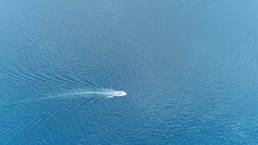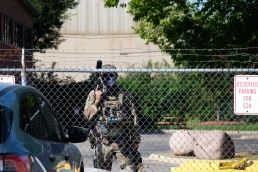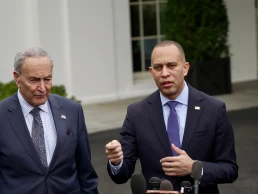The Trump administration’s murderous strikes on small boats at sea constitute unlawful extrajudicial killings.
By Marjorie Cohn, truthout
As the Trump administration continues to murder people in small boats on the high seas and mounts the largest U.S. military buildup in decades in the Caribbean, it is moving inexorably toward an all-out, illegal attack and forcible regime change in Venezuela.
Despite Team Trump’s feeble attempts to legally justify its ocean strikes, which have now killed 57 people since early September, those extrajudicial killings are also unlawful.

Donald Trump’s murderous campaign came into focus on February 20, when the State Department designated eight drug trafficking organizations, including Tren de Aragua, as foreign terrorist organizations. Although the administration has attempted — so far unsuccessfully — to use that designation to justify sending immigrants to a notorious prison in El Salvador, Trump is now invoking it in an effort to validate his illegal strikes at sea.
Moreover, on March 15, Trump issued “A Proclamation,” alleging that Tren de Aragua has been engaged, in association with Venezuelan President Nicolás Maduro, in “irregular warfare” in the United States, with no explanation of what is meant by irregular warfare. But on February 26, most U.S. intelligence agencies had made a finding that Tren de Aragua was neither controlled by the Venezuelan government, nor was it committing crimes in the United States on its orders.
On September 2, Trump announced that the U.S. had conducted a “kinetic strike” against an alleged drug smuggling vessel in the Caribbean, even though Secretary of State Marco Rubio said the U.S. military could have interdicted the vessel rather than killing all of those on board. Trump wanted to “send a message,” hardly an excuse for premeditated murder.
The lawful procedure would have been to arrest people if there was probable cause they were involved in drug trafficking and bring them to justice in accordance with due process. Both U.S. and international law provide for the arrest of alleged drug traffickers or individuals suspected of acts of terrorism, both on the high seas and in U.S. territorial waters.
In a post on social media accompanied by a video clip of the strike, Trump declared that the attack was “against positively identified Tren de Aragua Narcoterrorists” and referred to the February 20 foreign terrorist organization designation. This did not provide a lawful basis for murdering alleged drug dealers.
Although Trump’s stated rationale is preventing drugs from Venezuela entering the United States, Venezuela isn’t even mentioned in the U.S. Drug Enforcement Administration’s National Drug Threat Assessment 2024.
No State of Armed Conflict, No Unlawful Combatants, No Self-Defense
It was reported in early October that Trump had notified several congressional committees that the U.S. is engaged in a formal “armed conflict” with drug cartels that his administration has branded terrorist organizations, and that suspected drug smugglers are “unlawful combatants” in order to justify the strikes as self-defense.
“The President determined that the United States is in a non-international armed conflict with these designated terrorist organizations,” the memo says. Trump ordered the Defense Department to “conduct operations against them pursuant to the law of armed conflict,” adding, “The United States has now reached a critical point where we must use force in self-defense and defense of others against the ongoing attacks by these designated terrorist organizations.”
The memo referred to a September 15 strike by the U.S. that “resulted in the destruction of the vessel, the illicit narcotics, and the death of approximately 3 unlawful combatants.”
By labeling the murdered people in the boats “unlawful combatants,” Trump is conflating them with al-Qaeda, which the Bush administration targeted in its “war on terror.” Last week, Secretary of War Pete Hegseth said, “If you are a narco-terrorist smuggling drugs in our hemisphere, we will treat you like we treat al-Qaeda.” But Tren de Aragua is no al-Qaeda.
The Supreme Court determined after the September 11, 2001, attacks that the conflict with al-Qaeda was a real war, and therefore the George W. Bush administration could hold captured members indefinitely. But the court also said that the government must treat them humanely under the Geneva Conventions, which means they can’t torture or kill them. Al-Qaeda had attacked the U.S. by weaponizing hijacked planes and intentionally killing people, and Congress had authorized the use of armed force against the group.
Trump cannot rely on the 2001 Authorization for the Use of Military Force (AUMF) that Congress enacted after the September 11 attacks. That AUMF, which was misused by the Obama and Biden administrations to justify several drone strikes and other illegal uses of military force, authorized the president “to use all necessary and appropriate force against those nations, organizations, or persons he determines planned, authorized, committed, or aided the terrorist attacks that occurred on September 11, 2001, or harbored such organizations or persons.” That statute does not provide a legal basis to use force against Tren de Aragua.
Nor can Trump rely on his constitutional authority to use lethal force in self-defense under Article II. He would have to be acting to prevent an imminent attack on the United States or U.S. persons abroad. “There is no evidence that this group is committing an armed attack against the U.S. that would allow the U.S. to use military force against it in national self-defence,” three UN experts said.
“International law does not allow governments to simply murder alleged drug traffickers,” the experts noted, calling Trump’s strikes extrajudicial executions. “Criminal activities should be disrupted, investigated and prosecuted in accordance with the rule of law, including through international cooperation.”
There is no current state of armed conflict, there is no evidence that the people on the boats were combatants, and it is illegal to deliberately attack civilians. “This is not stretching the envelope,” Geoffrey Corn, a retired judge advocate general lawyer who was formerly the Army’s senior adviser for law-of-war issues, told The New York Times. “This is shredding it. This is tearing it apart.”
The strikes on boats also violate the right to life enshrined in the International Covenant on Civil and Political Rights, which the U.S. has ratified, making it part of U.S. law under the Supremacy Clause of the Constitution. The covenant says that “no one shall be arbitrarily deprived of his life.” It outlaws extrajudicial killing outside the context of armed conflict or by law enforcement when necessary to protect against an imminent threat to life.
An Attack on Venezuela Would Be an Unlawful Act of Aggression
In addition to its increasing numbers of murders of alleged drug smugglers at sea, the Trump administration is positioning tremendous military firepower for what appears to be an imminent attack on Venezuela.
Hegseth ordered the USS Gerald R. Ford aircraft-carrier strike group with five destroyers to deploy to the region to “bolster U.S. capacity to detect, monitor, and disrupt illicit actors and activities that compromise the safety and prosperity of the United States,” according to a Pentagon spokesperson.
“The only thing you could use the carrier for is attacking targets ashore, because they are not going to be as effective at targeting small boats at sea,” Bryan Clark, senior fellow at the Hudson Institute and retired Navy officer, told The Atlantic. “If you are striking inside Venezuela, the carrier is an efficient way to do it due to the lack of basing in the region.”
There are now over 6,000 sailors and Marines on eight warships in the area. The USS Ford strike group could add nearly 4,500 more sailors and nine squadrons of aircraft. B-52H bombers deployed near Venezuela are capable of dropping nuclear weapons.
“There will be land action in Venezuela soon,” Trump said on October 23. “I’m not going to necessarily ask for a declaration of war. I think we’re just going to kill people that are bringing drugs into our country. Okay? We’re going to kill them. You know, they’re going to be like, dead.”
The Pentagon has reportedly prepared plans for military attacks inside Venezuela, and Trump has authorized the CIA to engage in lethal covert operations in the country.
A report from the Center for Strategic and International Studies outlined options for regime change in Venezuela. It sets forth the requisite numbers of troops, naval assets, air assets, and ground assets that would be required.
The United Nations Charter prohibits the threat or use of force against another state unless conducted in self-defense against an armed attack or authorized by the UN Security Council. As explained above, there has been no armed attack. Self-defense is thus not available to Trump. The Charter is part of U.S. law under the Supremacy Clause.
If Trump attacks Venezuela, his administration would be committing an unlawful act of aggression. According to the definition set forth in General Assembly Resolution 3314, which has been adopted by the Rome Statute for the International Criminal Court, “Aggression is the use of armed force by a State against the sovereignty, territorial integrity or political independence of another State, or in any other manner inconsistent with the Charter of the United Nations.”
In addition, the Charter of the Organization of American States (OAS) requires all member states, including the U.S., to refrain from the use of armed force against any other member state (including Venezuela) except in self-defense.
Forcible Regime Change Violates Venezuela’s Right to Self-Determination
During his first term, Trump repeatedly voiced his desire to invade Venezuela and change its regime. He was preoccupied with the idea of an invasion, the AP reported.
In 2019, the Trump administration orchestrated an unsuccessful strategy led by Rubio to carry out a coup d’état, seize power from Maduro, and install Juan Guaidó as “interim president” of Venezuela.
Now as secretary of state, Rubio is once again leading the charge to oust Maduro. The State Department is offering a reward of up to $50 million for information leading to Maduro’s arrest and conviction on drug charges.
U.S. officials have clearly said in private that the goal is the removal of Maduro from power.
Both the UN Charter and the International Covenant on Civil and Political Rights guarantee the right to self-determination. That means no forcible regime change.
The OAS Charter says:
Every State has the right to choose, without external interference, its political, economic, and social system and to organize itself in the way best suited to it, and has the duty to abstain from intervening in the affairs of another State.
In a statement, Venezuela rebuffed Trump’s “bellicose” language, accusing him of seeking “to legitimize regime change with the ultimate goal of appropriating Venezuela’s petroleum resources.”
The International Association of Democratic Lawyers (IADL) condemned the U.S. deployment of military firepower off the coast of Venezuela and illegal bombing and boarding of Venezuelan fishing vessels and issued the following statement:
These developments also come after over 23 years of direct US involvement in coups and coup attempts in Venezuela, routine interference in Venezuelan elections, the imposition of unlawful unilateral coercive measures designed to impoverish the Venezuelan people, the arrest and detention of Venezuelan diplomats, the unlawful confiscation of Venezuelan assets held in foreign banks, and prior attempted landings by US mercenaries.
IADL also noted that Venezuela “holds the largest recorded oil resources globally, as well as the fourth largest resources of natural gas, and US corporations have repeatedly interfered to block or seek to control the country’s independent economic development and trade in resources.”
On October 24, Maduro announced that Venezuela is assembling an international volunteer brigade to confront U.S. intervention or aggression there. “We have received proposals from all over Latin America and the Caribbean, from Asia, Africa, and from many other places. I have seen videos on social media from many people, social leaders, saying that they too are getting ready,” he said. Commenting on the U.S. military deployment and deadly strikes on small boats in the Caribbean, Maduro called Washington’s aggression “a new eternal war.”
Venezuela has mobilized the Bolivarian Militia, adding 3 million members to the 8 million already part of that branch of the military. In addition, Venezuela has fortified its borders and begun massive military drills to oppose any U.S. entry into its territory.
National courts around the world should investigate and charge U.S. officials, including Trump, Rubio, and Hegseth, with murder under well-established principles of universal jurisdiction.
And we must mobilize a powerful antiwar movement to demand that the U.S. government stop the illegal boat murders and stay out of Venezuela.
Recent Posts
Judge Blocks Noem Effort to Bar Surprise ICE Jail Inspections as Detention Deaths Mount
February 4, 2026
Take Action Now A federal judge halted the DHS secretary’s renewed effort to block surprise inspections as deaths, overcrowding, and abuse…
Russia Ready to Respond to Any U.S. Weapons Deployment in Greenland: Ryabkov
February 3, 2026
Take Action Now With New START, the last nuclear treaty between Russia and US set to end, Moscow says it’s ready for more dangerous world.By News…
Trump’s Ultimatum to Cuba: Fuel or Surrender!
February 3, 2026
Take Action Now Trump’s latest executive order is an intensification of the six-decade US policy which seeks to suffocate and strangle Cuba’s economy…
As Trump Attacks the Republic, the Cowardly Democratic Party Still Won’t Fight to Win
February 2, 2026
Take Action Now With few exceptions, the Democratic Party apparatus is coasting, playing “it safe,” and expecting that the Trumpsters will deliver…




